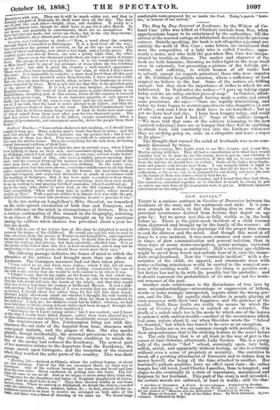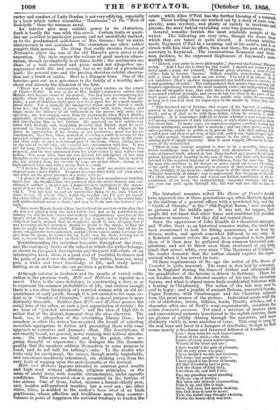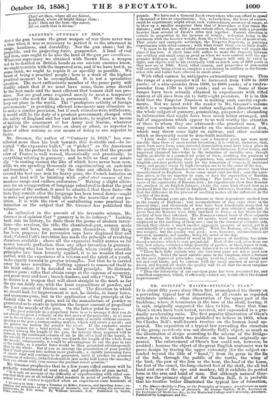NEW NOVELS. * THERE is a curious contrast in Gordon of
Duncairn between the incidents of the story and the sentiments and style. It is com- mon enough in novels to find. the leading idea or some of the principal occurrences derived from fictions that depict an age gone by ; but we never met this so fully visible as in the book before us. There is the joint-stock incident of a child rescued from shipwreck and brought up by the family of the rescuer; all efforts failing to discover its parentage till the proper time comes to end the distress and the novel. And though this must at all times be a rare incident, it was more common and more natural in times of slow communication and general isolation, than in these days of ocean steam-navigation penny-postage, universal writing, and reporting as universal. Half a century ago children might be saved. from wreck and nobody hear of it, save the imme- diate neighbourhood. Now the "romantic incident" with a de- scription of the child, its apparel, and ornaments done with penny-a-lining minuteness would be carried to the remotest cor- ners of the reading world. Of course the thing is possible now ; but fiction has not to do with the possible but the probable ; and it should represent the probabilities of its own age not the worn- out romance of the past. Another stale contrivance is the disturbance of true love by mere misunderstandings—miscarriage or suppression of letters, words or looks wrongly interpreted, reports about the wrong per- son, and the like. An equally stale artifice is people playing at cross purposes with their own happiness and the patience of the reader. Both these faults are really the means by which the story of Gordon of Duncairn is carried. on or retarded. The death of a nabob uncle too is the mode by which one of the heroes is endowed with sudden wealth—another of the occurrences which had some nature about it, say when Sheridan wrote the "School for Scandal," but which has ceased to be save as an exception. These faults are as we say- common enough with novelists ; it is their preponderance that is the striking feature in the novel before us. The only thing that is at all fresh in the way of plot is the career of Jane Osborne, afterwards Lady Gordon. She is a young lady of the modern " fast " school, seemingly open, very bold, selfish, artful, and apparently without feeling, as she is certainly without even a sense of propriety or morality. She contrives to break off a growing attachment of Duncairn and to induce him to marry herself, she being all the time attached to another. Her husband's pattern qualities have no effect upon Jane ; she rather tempts her old lover, Lord. Charles Lascelles than is tempted ; and elopes to die eventually in a state of repentance, maintained and forgiven by her husband. This part of the story is well intended ; for certain morals are enforced., at least in words ; still the eha- • Gordon of Duncairn. A Novel. In two volumes. Published by Bentley. Hills and Hollows; or Ways :through the World. A novel. In three volumes. By the Author of" Blanche and the Betrothed." Published by Newby. The House of Camelot. A Tale of the Olden Time, By Mari Linwood. In:twO volumes. Published by Rope.
racter and conduct of Lady Gordon is not very edifying, especially in a book which rather resembles "Heartsease" or the "heir of Redclyffe " than the common novel. An inferior plot may exhibit power in its characters. Such is hardly the ease with this novel. Certain traits or quali- ties are ascribed to particular persons and not unskilfully marked, as in the goodnatured selfishness of Mrs. Grieme ; but an entire idiosyncracy is not sustained. The characters are often rather puppets than persons. The thing that really elevates Gordon of Duncairn above the run of the old Minerva press novel is the execution. The style argues the culture of good modern educe- cation, though its simplicity is at times feeble ; the sentiments are those of a well nurtured and pious mind not altogether un- acquainted with life and society, but as we infer of a provincial kind ; the general tone and the passing sketches exhibit observa- tion and a touch of satire. Here is a Glasgow beau. One of the heroines goes out as a governess in the family of a wealthy mer- chant and attracts the attention of the heir.
"There was a slight interruption to this quiet routine on the return of Charles Bella. It was at one of Mrs. Baillie's numerous soirees that Minnie first became aware of his arrival. She had been accompanying her pupils; when the piece was finished, she noticed, as she rose from the piano, a pair of shadeless light-grey eyei fixed upon her in a most unmiti- gated stare. For a moment the unexpected vision nearly forced a smile from her; the flashy style of dress, resplendent with studs, chains, and rings, made the absence of all refinement in the person only more con- spicuous; she was turning away from the instrument when Helen Baillie, apparently at the youth's suggestion, arrested her by bringing him forward and introducing him as her brother. He appeared on very satisfactory terms with himself, and, imagining probably that Minnie must be over- powered by timidity, he sought to reassure her by a loud whisper to his sister in approbation of the beauty of her governess,- great was his as- tonishment, therefore, when, instead of receiving a smile in return for the intended compliment, he saw her quietly arrange the music on the piano, and then retire at once to a distant part of the room, where, sitting down by the side of an old lady, she entered into conversation with her. It was not for long, however, that she was allowed to remain there ; dancing was proposed, and she was summoned from her quiet corner to play waltzes and polkas. For sonic little time she was allowed the indulgence of her own thoughts as her fingers mechanically performed their office, but by-and-by she was startled from her reverie by some one at her elbow, saying in a high-pitched voice and with a strong Scotch accent, "'1 declare, Miss Gray, it's ,just a shame to mak' sae mickle grace and elegance into a mere fiddler. Ye maim let some ither leddy tak' your place, and allow me the great pleasure of a waltz with ye.' "A stance at the speaker showed Minnie her new acquaintance standing beside her : she thanked him, but professed that she never danced, and con- sidered it neither a trouble nor a degradation to contribute to the amuse- ment of those who did. Yell no dance, Miss Gray ? Hech ! then, neithea- will I. 'Pon my saul 'tis just an unwiselike thing to do, and, when a's dune, its nae ilk a body that's warth the trouble : sae I'll just gie 'user the extraordinae pleesure o' sittin' here,' said the youth, as he seated him- self saddle-fashion across a chair, and may be I can turn the leaves o' yee bulk.'
"Once more Minnie thanked him, but declined his services on the plea that she was not playing from the notes before her, and as he persisted in re- taining the seat he had taken and making complimentary speeches on the beauty of her hands, the nimbleness of her fingers, and so forth, she was obliged at last to request that he would not speak to her, alleging that it was necessary all her attention should be given to the music, so that the dancers might not be disturbed. Finding then after a time that all his de- licate compliments were unheeded, and his efforts vain to make her raise her eyes from the piano, he turned his leg lazily over the chair, leaving her at last, to bestow his attentions on those who would prize them more."
Notwithstanding the imitation traceable throughout the story, and the customary faults of the school to which the writer belongs, as shown in elongated descriptions and frequent reflections of an interruptive kind, there is a good deal of youthful freshness and the germ of power over the attention. The writer, however, must gain a wider and truer knowledge of life, and study novel- writing as an art before she can produce a genuine fiction.
Although inferior in freshness and the results of varied culti- vation to the previous work, Hills and Hollows is superior as a novel. There is the same deficiency in constructing a story so as to represent the common probabilities of life, and curious enough there is a too close friendship of a married woman with an old ac- quaintance of early youth, though it is not carried to the same ex- tent as in "Gordon of Duncairn," while a moral purpose is more distinctly traceable. Neither does Hills and Hollows possess the social tone of the other, or such a just appreciation of society ; for we hear of "jeweled aristocrats"; and the idea' of high life is rather that of the distant democrat than the close observer. The book, too, is altogether of the circulating library class ; but somehow or other the writer has acquired the knack of selecting materials appropriate to fiction and presenting them with some approach to narrative and dramatic effect. The descriptions, if not exactly broad, are general, never running into tedious minute- ness ; the reflections are brief and to the point, often ar- guing thought or experience ; the dialogue has this dramatic qualits that the speakers address themselves to some purpose in hand, and do not talk for talking's sake. To the reader who looks only for excitement, the scenes, though mostly improbable, and sometimes needlessly introduced, are striking even from the :Very fault of verging upon the melodramatic or the farcical. Hills and Hollows appears intended to contrast great wealth and high rank without affection, religious principles, or the Sense of social duty, with humble circumstances, under opposite conditions. This contrasted view is presented in the fortune of two sisters. One of them, Isabel, marries a formal elderly peer, and, besides self-produced troubles, has a roué son ; the other sister, Alice, is wedded to the author's beau ideal of an Irish gentleman, whose affection and kindliness more than counter- balance in point of happiness the national tendency to burden the estate ; while Alice O'Neil has the further blessing of a no h son. These leading ideas are worked out by a story of some eete. plexity, some mystery, and plenty of variety in incidents aaa persons, the story indeed extending over two generations. General remarks furnish the most available sample of the writer. The following are very true, though the scene fro -- which they are taken is quite absurd. A veteran mjnj rat meets Raymond O'Neil in a morning call at his aunt's, and is se struck with him that he offers, then and there, the post of private secretary to Raymond. The conscientious Romanist and Irish. man declines, to the expressed displeasure of Raymond's mere worldly sister. " Indeed, your sister is more philosophic,' observed the Cabinet midget archly. And I fear she is fitter for this world. I should not wonder if you never made a name for yourself. Without great interest, a man of your calibre fails to become ?ourself. Gifted, sensible, persevering, there is still a want that holds such an one down. I've seen it in others. It is not indolence (that's another temperament) nor indifference to success; it is independence of mind ! The independence that spurns time-serving, sad despises expediency towards the most laudable ends—the independence that esteems all struggles base, that only strive for man's applause. Ambition is accursed without principle, and succeeds but too often at the price of in- ward peace and public esteem; for the public only value the successful, so long as it can well shut its argus-eyes to the means by which they suc- ceeded.'
"This favoured one of fortune, this reaper of his harvest of ambition arrived at the summit of his hopes, expressed these uttlooked-for spirzjsss freely, and as if glad to be with those before whom he could do so with
propriety. It is sometimes difficult to decide whether a man is more
him-
self among companions of daily intercourse, or with others supposed to know less about him. In many cases, circumstances impose a certain bearing and certain sentiments, assumed like a uniform ; and one often grows trnreal to suit a position, either in public or in private life. Like that uniform, it is a relief now and then to get free of this stiff, puffed-out, tight-clasped get. up '—this mental deportment,' and appear in the easy, natural, um. miming garb of simple sincerity. This is most happily effected in the pre- sence of the uninitiated.
"There is some courage required to dare to be a moralist, where our fellow worldlings class us professionally with themselves. Probably the voice of inward truth, uttered at last (long hushed up,) passes for the most unreal, hypocritical humbug in the ears of those, who have only heretofore listened to the acquired language of worldliness, from the same lips. Thug the man who ventures to let nature or grace speak out versus affectation, or the spirit of the world, generally is accused at that moment of playing on the credulity of his hearers ; unless these be of the class whose motto is, Charity believeth all things,' and to understand that language to the
We often unveil our hearts and reveal our holiest convictions to the ac- quaintance of an hour, the sympathizing, congenial stranger, who may not cross our path again through life, but who will not call us false or fool."
The historical romance called The House of Camelot- should have appeared two or three generations ago, when Macbeth figured
in the uniform of a general officer with a powdered wig, and the "Castle of Otranto," or the "Old English Baron," were accepted as pictures of the middle ages. It was not, we suppose, that people did not know that other times and countries had peculiar costumes or manners ; but they did not regard 'them. Since the appearance of John Kemble as a theatrical manager, and Walter Scott as an historical romance writer, the world has been accustomed to look for fitting accessories, or at least for dresses, modes, and speech somewhat different to our own. If a fictionist cannot revive the past, he is expected to have juster ideas of it than may be gathered from common historical com- pilations, and not to throw even them overboard at any little pinch that arises ; while, ever since "The Mysteries of Ildolpho," the reader demands that the author should explain the super- natural when it has served its turn.
Of these requirements of the age the writer of The House of Camelot is quite innocent. The scene is first laid by retrospec- tion in England during the times of Arthur and afterwards till the grandfather of the heroine is driven to Brittany. There his son Avalloo meets the detested enemies of his race the victonons Saxons, and what is almost worse finds confidential followers with a leaning to Christianity. The action of the tale may now be said to begin ; and a jumble of ancient Britons, converted. Sasons, Pagan Teutons, with Charlemagne and his Christian subjects form the great masses of the picture. Individual actors with the role of chieftains, lovers, villains, bards, Druids, witches, and a character after one of Scott's semi-supernaturals, constitute the active dramatis persona. Yet amid a mixture of modern ideas and conventional romance transferred to the eighth century, there are gleams of ability shining through the narrative, and eleT3 distinctly visible in some snatches of verse. This song is sung by the real hero and lover at a banquet of chieftains, though he then seems merely a freedman and favoured follower of Avalloc. " Love ! thou balsa for each bereavement, Parent of the smile,—the sigh, Source of every great achievement, Wizard of the heart and eye ! I have breatli'd the gale of pleasure, Till its very sense was pain; I have lavish'd wealth and treasure, Till desire had nought to gain— I have pluck'd the flower of beauty, All that friendship had to give, Felt the charm of filial duty, Lost them all, and still I live. For, my guardian angel standing With my cup of destiny ;
Her mien and attitude commanding, Fills it up, and lifts it high. Once, but once, her pinion shaking, One rich drop is seen to move; This, the slumb'ring draught awaking, Proves the honey-drop was love.
Chief art thou, where all are fairest, Brightest, where all bright things shine ;
Love! thou art the best—the rarest, All on earth that is divine."




























 Previous page
Previous page